Leadership and Management for Service Industries Assignment Report
VerifiedAdded on 2023/01/23
|8
|1927
|53
Report
AI Summary
This report delves into the crucial aspects of leadership and management within the service industry, with a specific focus on the hospitality sector, using Hotel Wa-Pila and Holiday Inn as case studies. It begins by defining the roles and characteristics of effective leaders and managers, differentiating between hard and soft skills essential for success. The report explores the importance of communication, problem-solving, and decision-making abilities. Furthermore, it examines future management and leadership skills, including human relations and emotional intelligence, which are vital for adapting to changing industry dynamics. A comparative analysis between Wa-Pila and Holiday Inn highlights different leadership and management styles, such as democratic versus charismatic approaches and consultative versus persuasive management styles. The report concludes by emphasizing the significance of leadership and management theories in driving service industry success, motivating employees, and formulating effective policies and procedures. The report also references various books and journals to support the findings.
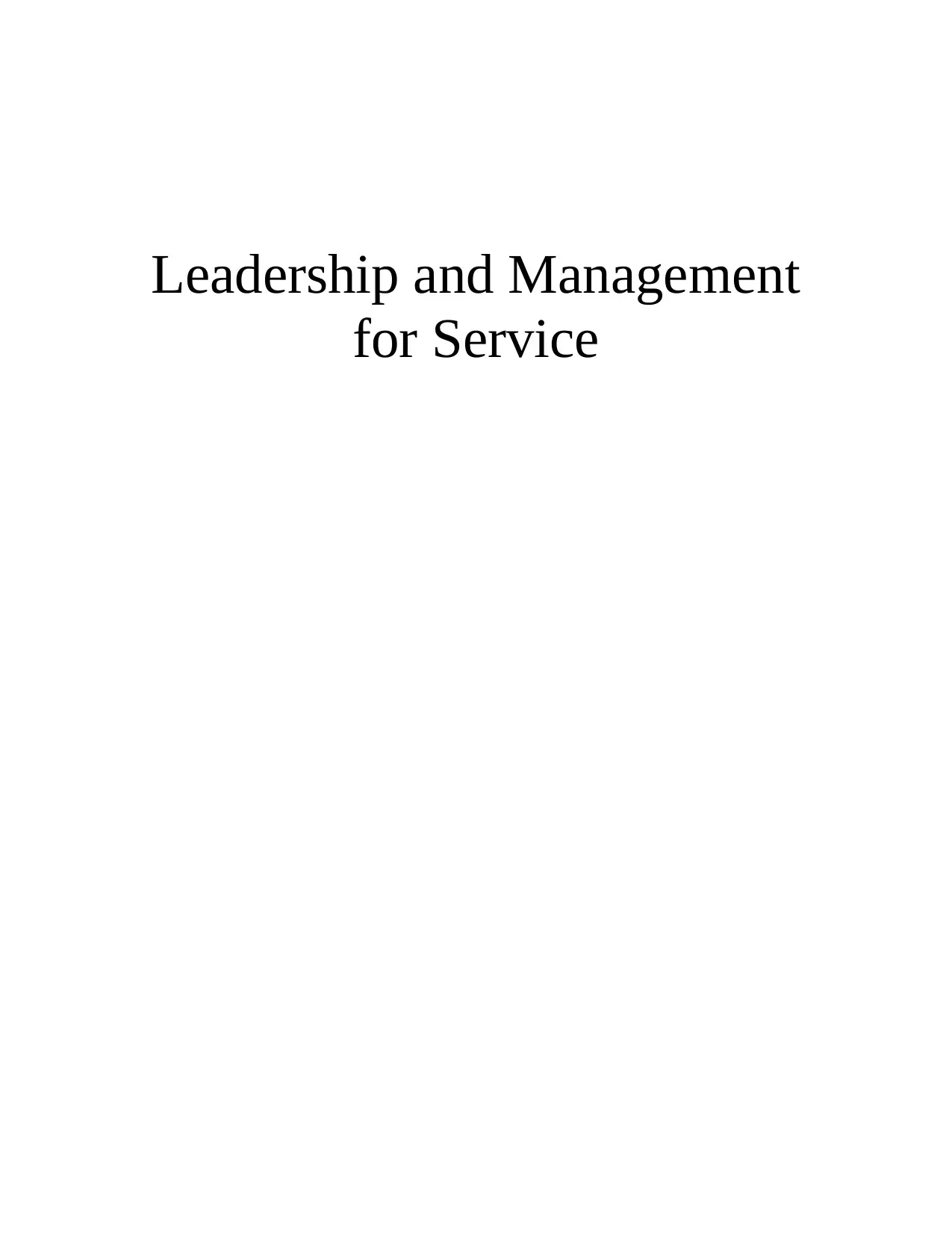
Leadership and Management
for Service
for Service
Paraphrase This Document
Need a fresh take? Get an instant paraphrase of this document with our AI Paraphraser
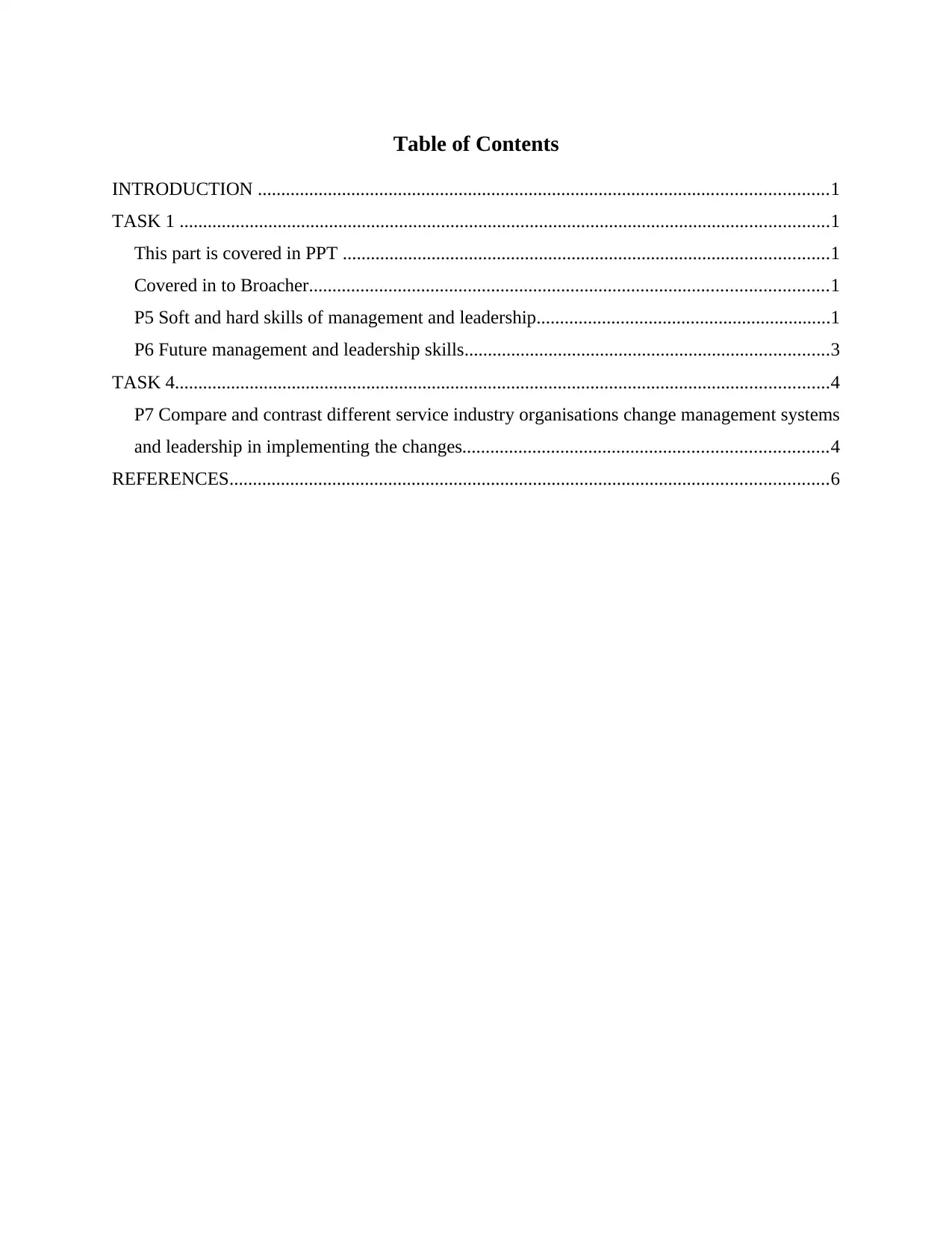
Table of Contents
INTRODUCTION ..........................................................................................................................1
TASK 1 ...........................................................................................................................................1
This part is covered in PPT ........................................................................................................1
Covered in to Broacher...............................................................................................................1
P5 Soft and hard skills of management and leadership...............................................................1
P6 Future management and leadership skills..............................................................................3
TASK 4............................................................................................................................................4
P7 Compare and contrast different service industry organisations change management systems
and leadership in implementing the changes..............................................................................4
REFERENCES................................................................................................................................6
INTRODUCTION ..........................................................................................................................1
TASK 1 ...........................................................................................................................................1
This part is covered in PPT ........................................................................................................1
Covered in to Broacher...............................................................................................................1
P5 Soft and hard skills of management and leadership...............................................................1
P6 Future management and leadership skills..............................................................................3
TASK 4............................................................................................................................................4
P7 Compare and contrast different service industry organisations change management systems
and leadership in implementing the changes..............................................................................4
REFERENCES................................................................................................................................6
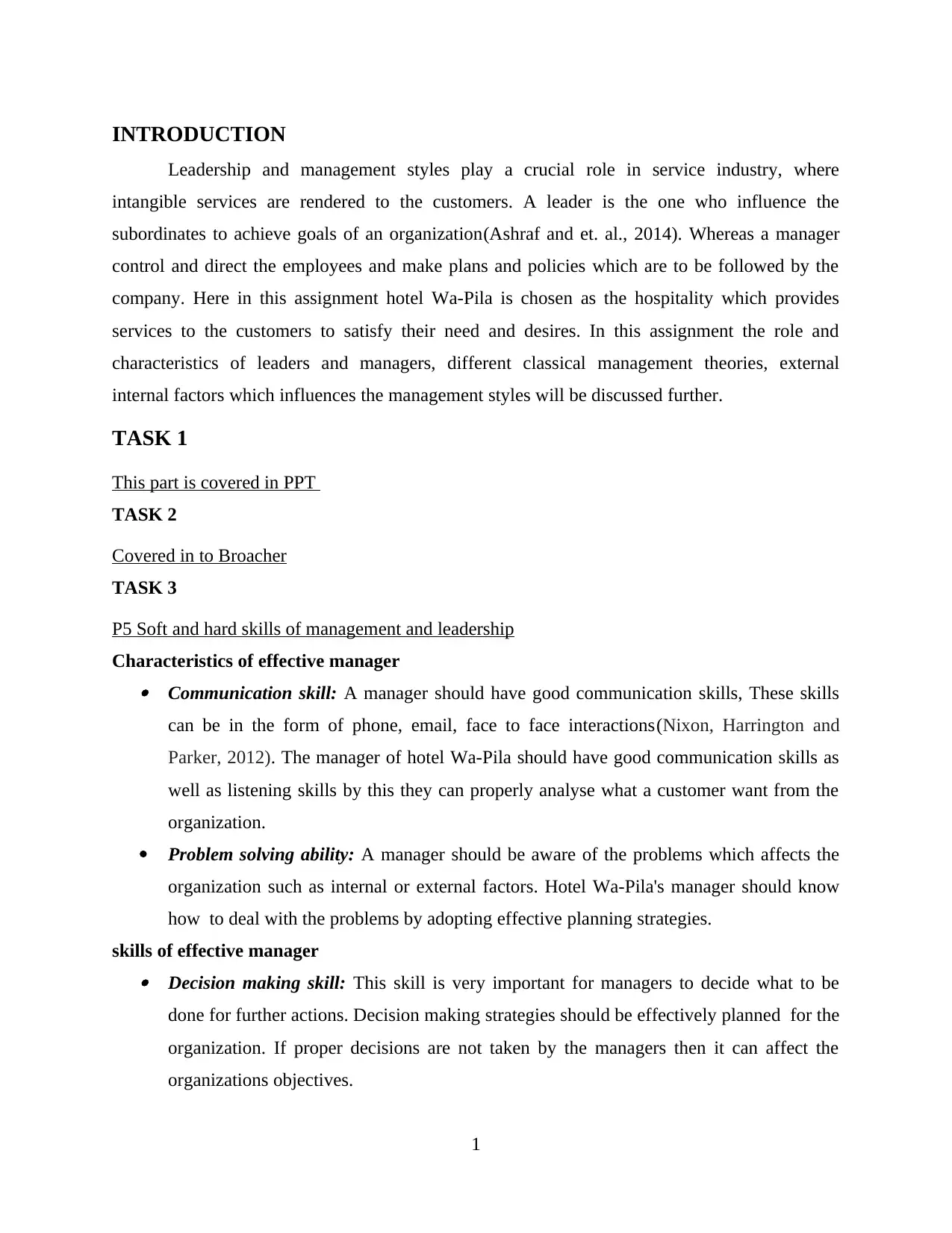
INTRODUCTION
Leadership and management styles play a crucial role in service industry, where
intangible services are rendered to the customers. A leader is the one who influence the
subordinates to achieve goals of an organization(Ashraf and et. al., 2014). Whereas a manager
control and direct the employees and make plans and policies which are to be followed by the
company. Here in this assignment hotel Wa-Pila is chosen as the hospitality which provides
services to the customers to satisfy their need and desires. In this assignment the role and
characteristics of leaders and managers, different classical management theories, external
internal factors which influences the management styles will be discussed further.
TASK 1
This part is covered in PPT
TASK 2
Covered in to Broacher
TASK 3
P5 Soft and hard skills of management and leadership
Characteristics of effective manager Communication skill: A manager should have good communication skills, These skills
can be in the form of phone, email, face to face interactions(Nixon, Harrington and
Parker, 2012). The manager of hotel Wa-Pila should have good communication skills as
well as listening skills by this they can properly analyse what a customer want from the
organization.
Problem solving ability: A manager should be aware of the problems which affects the
organization such as internal or external factors. Hotel Wa-Pila's manager should know
how to deal with the problems by adopting effective planning strategies.
skills of effective manager Decision making skill: This skill is very important for managers to decide what to be
done for further actions. Decision making strategies should be effectively planned for the
organization. If proper decisions are not taken by the managers then it can affect the
organizations objectives.
1
Leadership and management styles play a crucial role in service industry, where
intangible services are rendered to the customers. A leader is the one who influence the
subordinates to achieve goals of an organization(Ashraf and et. al., 2014). Whereas a manager
control and direct the employees and make plans and policies which are to be followed by the
company. Here in this assignment hotel Wa-Pila is chosen as the hospitality which provides
services to the customers to satisfy their need and desires. In this assignment the role and
characteristics of leaders and managers, different classical management theories, external
internal factors which influences the management styles will be discussed further.
TASK 1
This part is covered in PPT
TASK 2
Covered in to Broacher
TASK 3
P5 Soft and hard skills of management and leadership
Characteristics of effective manager Communication skill: A manager should have good communication skills, These skills
can be in the form of phone, email, face to face interactions(Nixon, Harrington and
Parker, 2012). The manager of hotel Wa-Pila should have good communication skills as
well as listening skills by this they can properly analyse what a customer want from the
organization.
Problem solving ability: A manager should be aware of the problems which affects the
organization such as internal or external factors. Hotel Wa-Pila's manager should know
how to deal with the problems by adopting effective planning strategies.
skills of effective manager Decision making skill: This skill is very important for managers to decide what to be
done for further actions. Decision making strategies should be effectively planned for the
organization. If proper decisions are not taken by the managers then it can affect the
organizations objectives.
1
⊘ This is a preview!⊘
Do you want full access?
Subscribe today to unlock all pages.

Trusted by 1+ million students worldwide
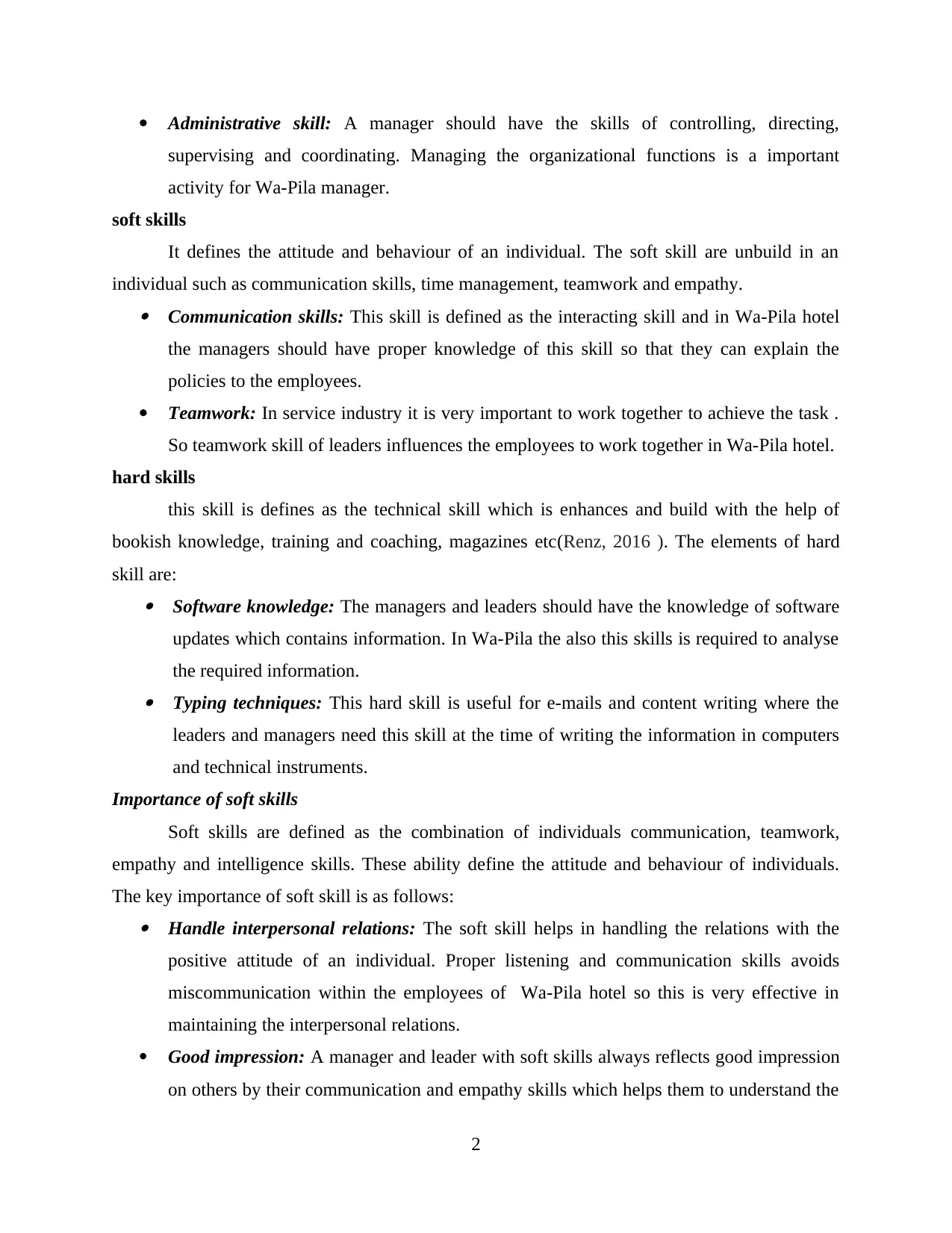
Administrative skill: A manager should have the skills of controlling, directing,
supervising and coordinating. Managing the organizational functions is a important
activity for Wa-Pila manager.
soft skills
It defines the attitude and behaviour of an individual. The soft skill are unbuild in an
individual such as communication skills, time management, teamwork and empathy. Communication skills: This skill is defined as the interacting skill and in Wa-Pila hotel
the managers should have proper knowledge of this skill so that they can explain the
policies to the employees.
Teamwork: In service industry it is very important to work together to achieve the task .
So teamwork skill of leaders influences the employees to work together in Wa-Pila hotel.
hard skills
this skill is defines as the technical skill which is enhances and build with the help of
bookish knowledge, training and coaching, magazines etc(Renz, 2016 ). The elements of hard
skill are: Software knowledge: The managers and leaders should have the knowledge of software
updates which contains information. In Wa-Pila the also this skills is required to analyse
the required information. Typing techniques: This hard skill is useful for e-mails and content writing where the
leaders and managers need this skill at the time of writing the information in computers
and technical instruments.
Importance of soft skills
Soft skills are defined as the combination of individuals communication, teamwork,
empathy and intelligence skills. These ability define the attitude and behaviour of individuals.
The key importance of soft skill is as follows: Handle interpersonal relations: The soft skill helps in handling the relations with the
positive attitude of an individual. Proper listening and communication skills avoids
miscommunication within the employees of Wa-Pila hotel so this is very effective in
maintaining the interpersonal relations.
Good impression: A manager and leader with soft skills always reflects good impression
on others by their communication and empathy skills which helps them to understand the
2
supervising and coordinating. Managing the organizational functions is a important
activity for Wa-Pila manager.
soft skills
It defines the attitude and behaviour of an individual. The soft skill are unbuild in an
individual such as communication skills, time management, teamwork and empathy. Communication skills: This skill is defined as the interacting skill and in Wa-Pila hotel
the managers should have proper knowledge of this skill so that they can explain the
policies to the employees.
Teamwork: In service industry it is very important to work together to achieve the task .
So teamwork skill of leaders influences the employees to work together in Wa-Pila hotel.
hard skills
this skill is defines as the technical skill which is enhances and build with the help of
bookish knowledge, training and coaching, magazines etc(Renz, 2016 ). The elements of hard
skill are: Software knowledge: The managers and leaders should have the knowledge of software
updates which contains information. In Wa-Pila the also this skills is required to analyse
the required information. Typing techniques: This hard skill is useful for e-mails and content writing where the
leaders and managers need this skill at the time of writing the information in computers
and technical instruments.
Importance of soft skills
Soft skills are defined as the combination of individuals communication, teamwork,
empathy and intelligence skills. These ability define the attitude and behaviour of individuals.
The key importance of soft skill is as follows: Handle interpersonal relations: The soft skill helps in handling the relations with the
positive attitude of an individual. Proper listening and communication skills avoids
miscommunication within the employees of Wa-Pila hotel so this is very effective in
maintaining the interpersonal relations.
Good impression: A manager and leader with soft skills always reflects good impression
on others by their communication and empathy skills which helps them to understand the
2
Paraphrase This Document
Need a fresh take? Get an instant paraphrase of this document with our AI Paraphraser
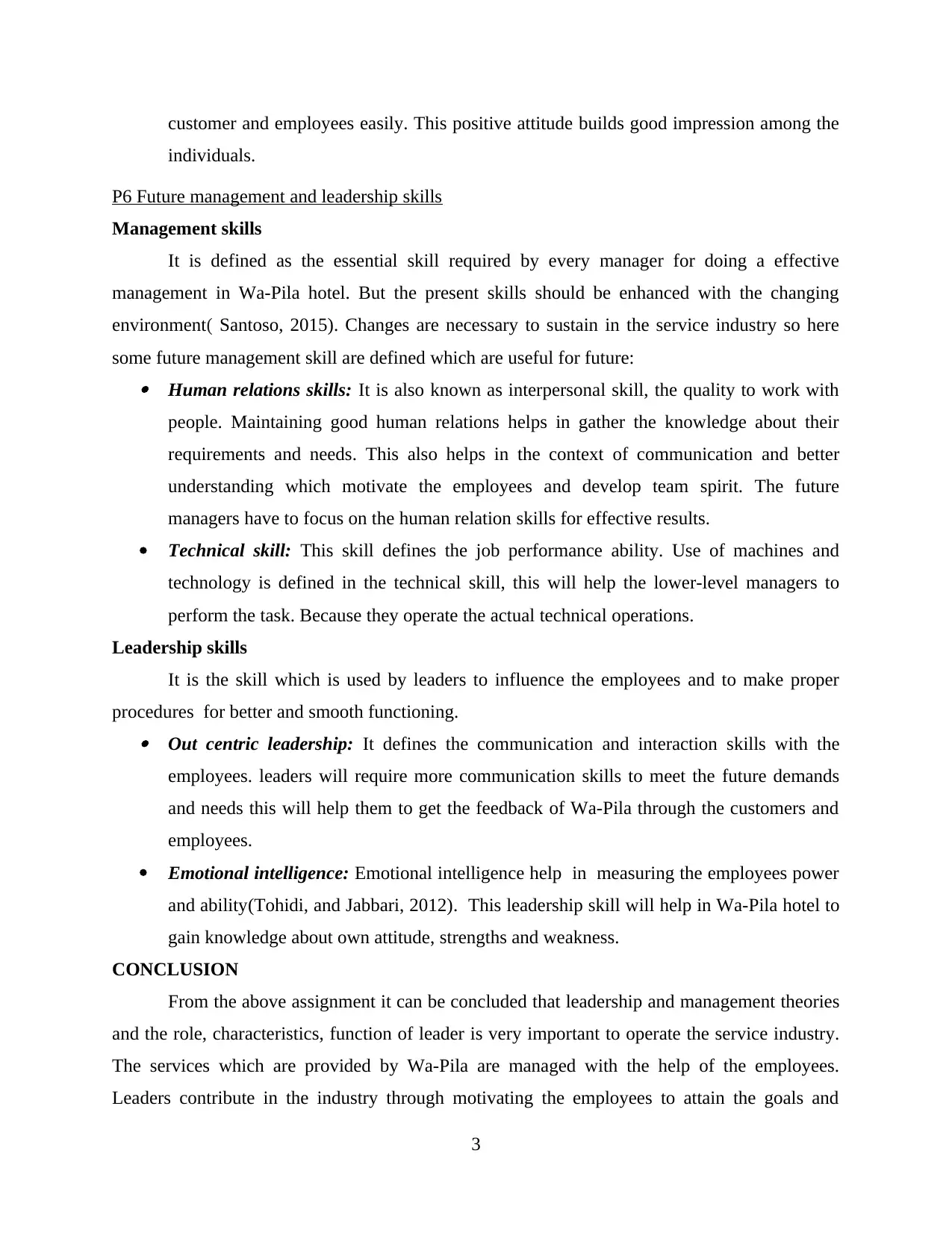
customer and employees easily. This positive attitude builds good impression among the
individuals.
P6 Future management and leadership skills
Management skills
It is defined as the essential skill required by every manager for doing a effective
management in Wa-Pila hotel. But the present skills should be enhanced with the changing
environment( Santoso, 2015). Changes are necessary to sustain in the service industry so here
some future management skill are defined which are useful for future: Human relations skills: It is also known as interpersonal skill, the quality to work with
people. Maintaining good human relations helps in gather the knowledge about their
requirements and needs. This also helps in the context of communication and better
understanding which motivate the employees and develop team spirit. The future
managers have to focus on the human relation skills for effective results.
Technical skill: This skill defines the job performance ability. Use of machines and
technology is defined in the technical skill, this will help the lower-level managers to
perform the task. Because they operate the actual technical operations.
Leadership skills
It is the skill which is used by leaders to influence the employees and to make proper
procedures for better and smooth functioning. Out centric leadership: It defines the communication and interaction skills with the
employees. leaders will require more communication skills to meet the future demands
and needs this will help them to get the feedback of Wa-Pila through the customers and
employees.
Emotional intelligence: Emotional intelligence help in measuring the employees power
and ability(Tohidi, and Jabbari, 2012). This leadership skill will help in Wa-Pila hotel to
gain knowledge about own attitude, strengths and weakness.
CONCLUSION
From the above assignment it can be concluded that leadership and management theories
and the role, characteristics, function of leader is very important to operate the service industry.
The services which are provided by Wa-Pila are managed with the help of the employees.
Leaders contribute in the industry through motivating the employees to attain the goals and
3
individuals.
P6 Future management and leadership skills
Management skills
It is defined as the essential skill required by every manager for doing a effective
management in Wa-Pila hotel. But the present skills should be enhanced with the changing
environment( Santoso, 2015). Changes are necessary to sustain in the service industry so here
some future management skill are defined which are useful for future: Human relations skills: It is also known as interpersonal skill, the quality to work with
people. Maintaining good human relations helps in gather the knowledge about their
requirements and needs. This also helps in the context of communication and better
understanding which motivate the employees and develop team spirit. The future
managers have to focus on the human relation skills for effective results.
Technical skill: This skill defines the job performance ability. Use of machines and
technology is defined in the technical skill, this will help the lower-level managers to
perform the task. Because they operate the actual technical operations.
Leadership skills
It is the skill which is used by leaders to influence the employees and to make proper
procedures for better and smooth functioning. Out centric leadership: It defines the communication and interaction skills with the
employees. leaders will require more communication skills to meet the future demands
and needs this will help them to get the feedback of Wa-Pila through the customers and
employees.
Emotional intelligence: Emotional intelligence help in measuring the employees power
and ability(Tohidi, and Jabbari, 2012). This leadership skill will help in Wa-Pila hotel to
gain knowledge about own attitude, strengths and weakness.
CONCLUSION
From the above assignment it can be concluded that leadership and management theories
and the role, characteristics, function of leader is very important to operate the service industry.
The services which are provided by Wa-Pila are managed with the help of the employees.
Leaders contribute in the industry through motivating the employees to attain the goals and
3
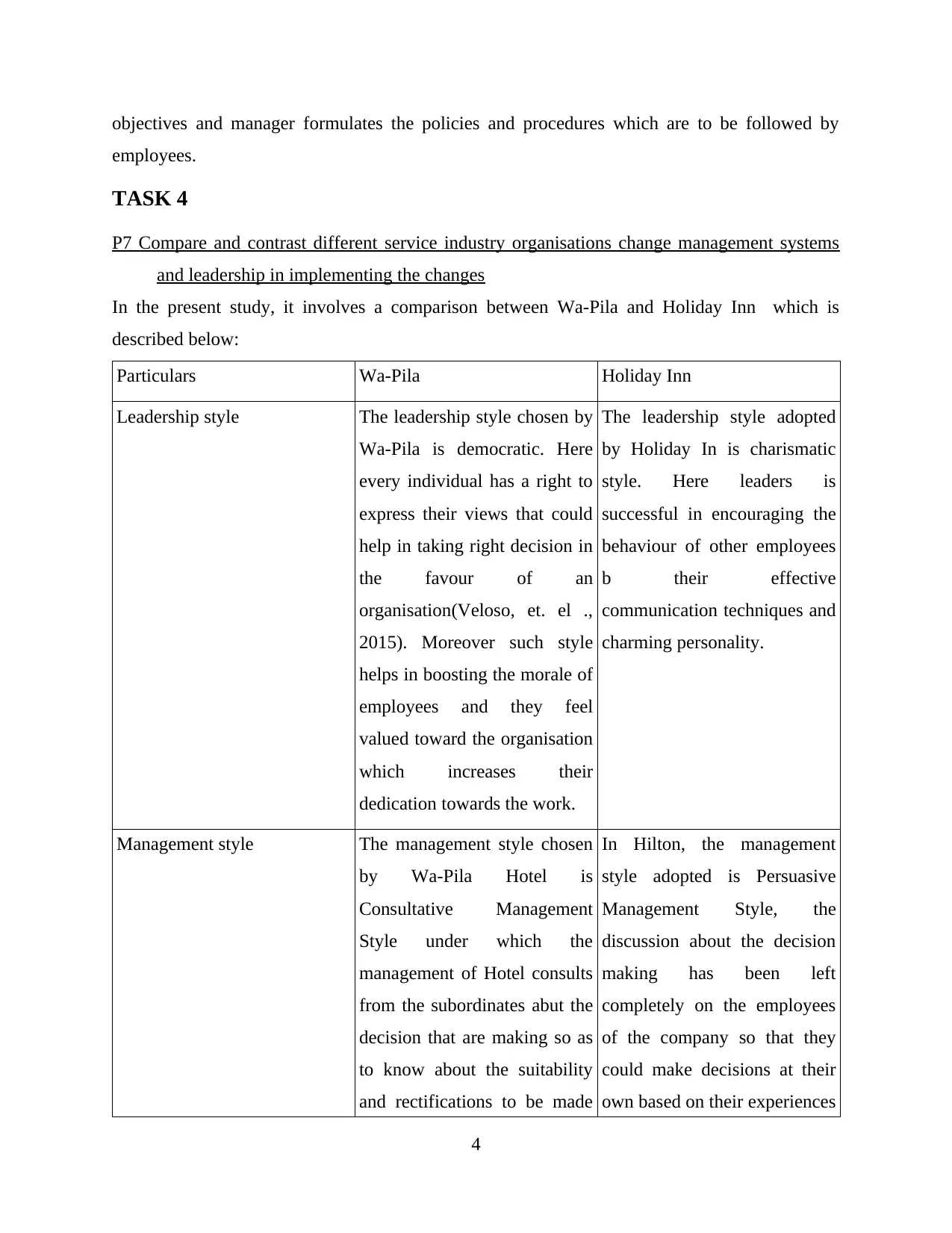
objectives and manager formulates the policies and procedures which are to be followed by
employees.
TASK 4
P7 Compare and contrast different service industry organisations change management systems
and leadership in implementing the changes
In the present study, it involves a comparison between Wa-Pila and Holiday Inn which is
described below:
Particulars Wa-Pila Holiday Inn
Leadership style The leadership style chosen by
Wa-Pila is democratic. Here
every individual has a right to
express their views that could
help in taking right decision in
the favour of an
organisation(Veloso, et. el .,
2015). Moreover such style
helps in boosting the morale of
employees and they feel
valued toward the organisation
which increases their
dedication towards the work.
The leadership style adopted
by Holiday In is charismatic
style. Here leaders is
successful in encouraging the
behaviour of other employees
b their effective
communication techniques and
charming personality.
Management style The management style chosen
by Wa-Pila Hotel is
Consultative Management
Style under which the
management of Hotel consults
from the subordinates abut the
decision that are making so as
to know about the suitability
and rectifications to be made
In Hilton, the management
style adopted is Persuasive
Management Style, the
discussion about the decision
making has been left
completely on the employees
of the company so that they
could make decisions at their
own based on their experiences
4
employees.
TASK 4
P7 Compare and contrast different service industry organisations change management systems
and leadership in implementing the changes
In the present study, it involves a comparison between Wa-Pila and Holiday Inn which is
described below:
Particulars Wa-Pila Holiday Inn
Leadership style The leadership style chosen by
Wa-Pila is democratic. Here
every individual has a right to
express their views that could
help in taking right decision in
the favour of an
organisation(Veloso, et. el .,
2015). Moreover such style
helps in boosting the morale of
employees and they feel
valued toward the organisation
which increases their
dedication towards the work.
The leadership style adopted
by Holiday In is charismatic
style. Here leaders is
successful in encouraging the
behaviour of other employees
b their effective
communication techniques and
charming personality.
Management style The management style chosen
by Wa-Pila Hotel is
Consultative Management
Style under which the
management of Hotel consults
from the subordinates abut the
decision that are making so as
to know about the suitability
and rectifications to be made
In Hilton, the management
style adopted is Persuasive
Management Style, the
discussion about the decision
making has been left
completely on the employees
of the company so that they
could make decisions at their
own based on their experiences
4
⊘ This is a preview!⊘
Do you want full access?
Subscribe today to unlock all pages.

Trusted by 1+ million students worldwide
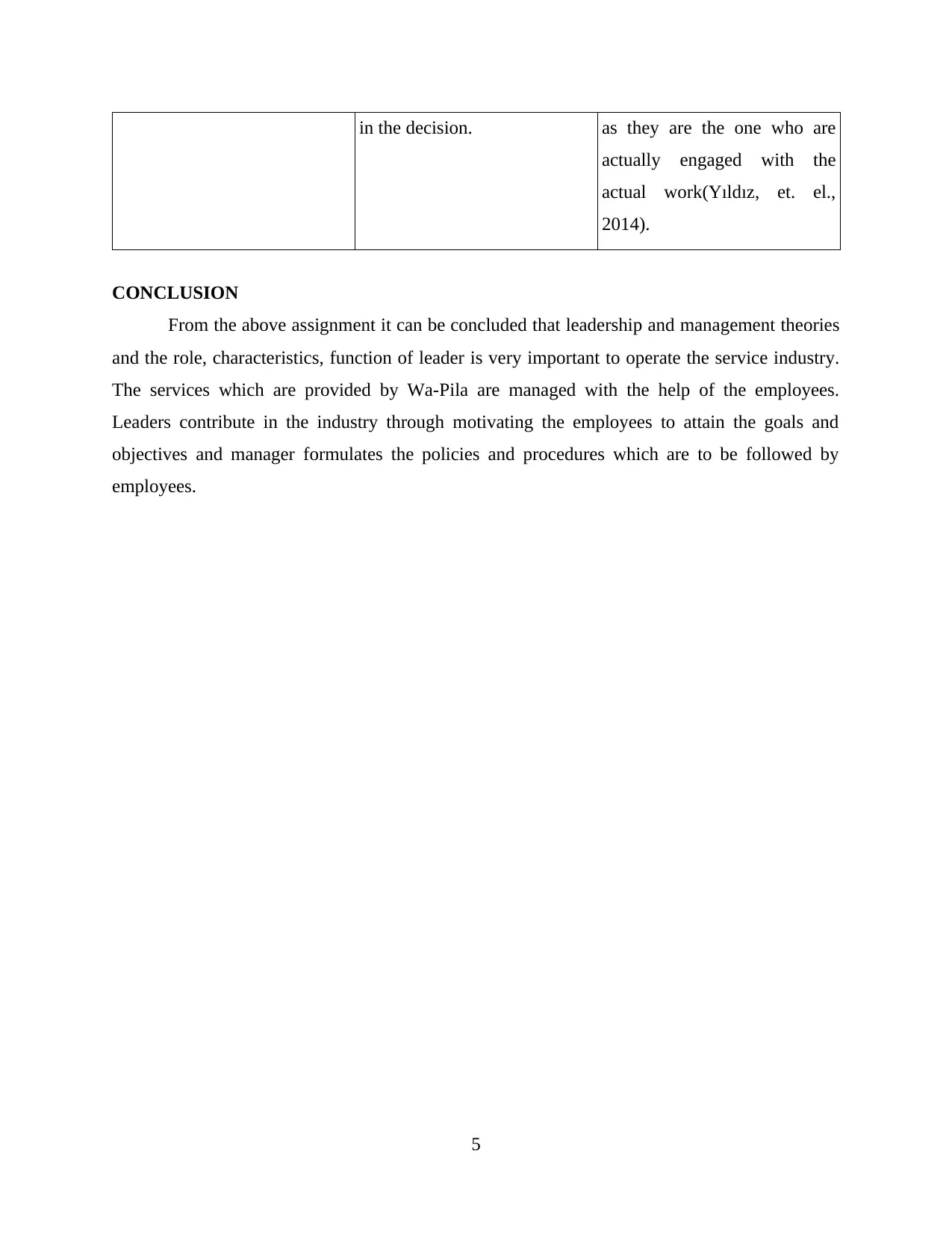
in the decision. as they are the one who are
actually engaged with the
actual work(Yıldız, et. el.,
2014).
CONCLUSION
From the above assignment it can be concluded that leadership and management theories
and the role, characteristics, function of leader is very important to operate the service industry.
The services which are provided by Wa-Pila are managed with the help of the employees.
Leaders contribute in the industry through motivating the employees to attain the goals and
objectives and manager formulates the policies and procedures which are to be followed by
employees.
5
actually engaged with the
actual work(Yıldız, et. el.,
2014).
CONCLUSION
From the above assignment it can be concluded that leadership and management theories
and the role, characteristics, function of leader is very important to operate the service industry.
The services which are provided by Wa-Pila are managed with the help of the employees.
Leaders contribute in the industry through motivating the employees to attain the goals and
objectives and manager formulates the policies and procedures which are to be followed by
employees.
5
Paraphrase This Document
Need a fresh take? Get an instant paraphrase of this document with our AI Paraphraser
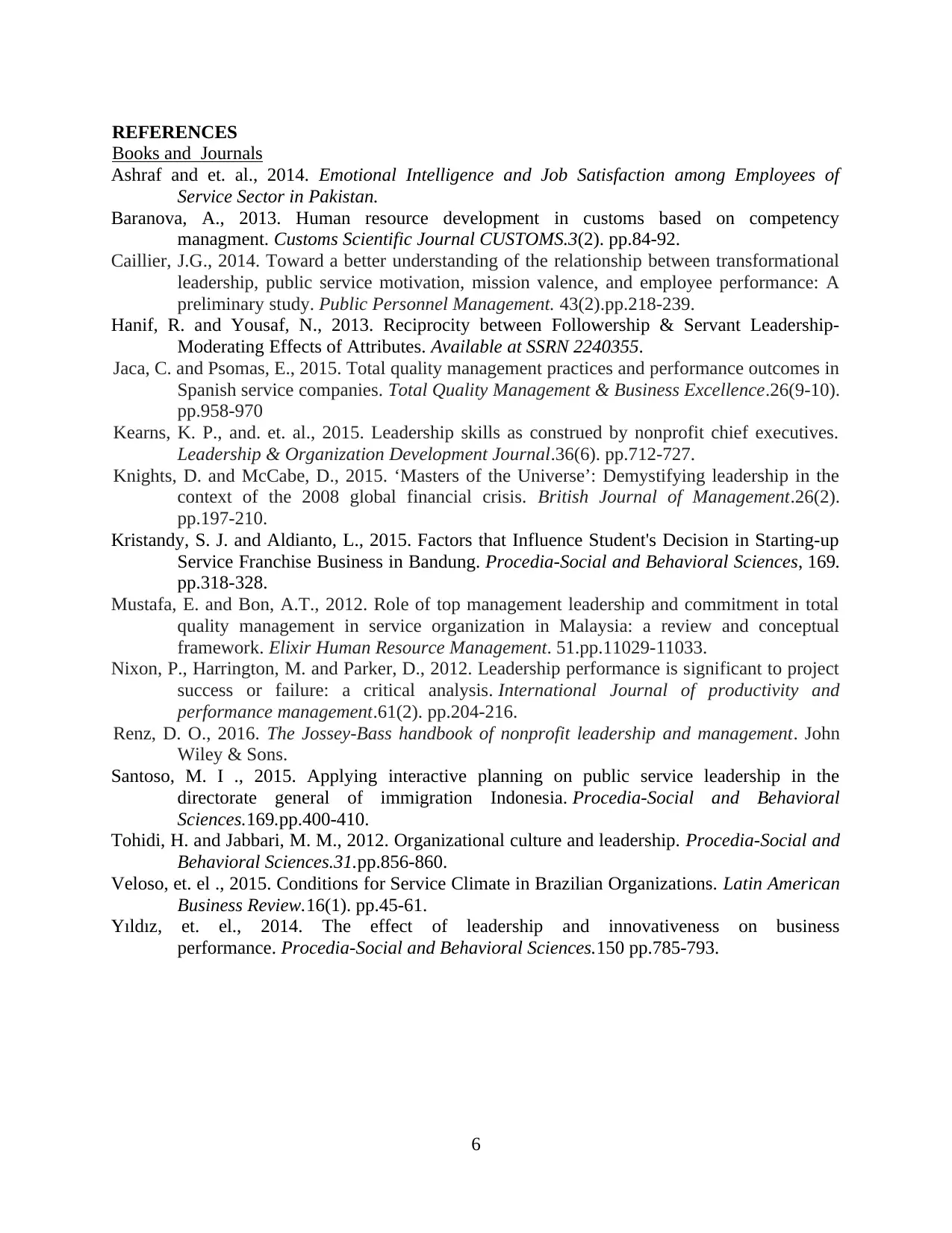
REFERENCES
Books and Journals
Ashraf and et. al., 2014. Emotional Intelligence and Job Satisfaction among Employees of
Service Sector in Pakistan.
Baranova, A., 2013. Human resource development in customs based on competency
managment. Customs Scientific Journal CUSTOMS.3(2). pp.84-92.
Caillier, J.G., 2014. Toward a better understanding of the relationship between transformational
leadership, public service motivation, mission valence, and employee performance: A
preliminary study. Public Personnel Management. 43(2).pp.218-239.
Hanif, R. and Yousaf, N., 2013. Reciprocity between Followership & Servant Leadership-
Moderating Effects of Attributes. Available at SSRN 2240355.
Jaca, C. and Psomas, E., 2015. Total quality management practices and performance outcomes in
Spanish service companies. Total Quality Management & Business Excellence.26(9-10).
pp.958-970
Kearns, K. P., and. et. al., 2015. Leadership skills as construed by nonprofit chief executives.
Leadership & Organization Development Journal.36(6). pp.712-727.
Knights, D. and McCabe, D., 2015. ‘Masters of the Universe’: Demystifying leadership in the
context of the 2008 global financial crisis. British Journal of Management.26(2).
pp.197-210.
Kristandy, S. J. and Aldianto, L., 2015. Factors that Influence Student's Decision in Starting-up
Service Franchise Business in Bandung. Procedia-Social and Behavioral Sciences, 169.
pp.318-328.
Mustafa, E. and Bon, A.T., 2012. Role of top management leadership and commitment in total
quality management in service organization in Malaysia: a review and conceptual
framework. Elixir Human Resource Management. 51.pp.11029-11033.
Nixon, P., Harrington, M. and Parker, D., 2012. Leadership performance is significant to project
success or failure: a critical analysis. International Journal of productivity and
performance management.61(2). pp.204-216.
Renz, D. O., 2016. The Jossey-Bass handbook of nonprofit leadership and management. John
Wiley & Sons.
Santoso, M. I ., 2015. Applying interactive planning on public service leadership in the
directorate general of immigration Indonesia. Procedia-Social and Behavioral
Sciences.169.pp.400-410.
Tohidi, H. and Jabbari, M. M., 2012. Organizational culture and leadership. Procedia-Social and
Behavioral Sciences.31.pp.856-860.
Veloso, et. el ., 2015. Conditions for Service Climate in Brazilian Organizations. Latin American
Business Review.16(1). pp.45-61.
Yıldız, et. el., 2014. The effect of leadership and innovativeness on business
performance. Procedia-Social and Behavioral Sciences.150 pp.785-793.
6
Books and Journals
Ashraf and et. al., 2014. Emotional Intelligence and Job Satisfaction among Employees of
Service Sector in Pakistan.
Baranova, A., 2013. Human resource development in customs based on competency
managment. Customs Scientific Journal CUSTOMS.3(2). pp.84-92.
Caillier, J.G., 2014. Toward a better understanding of the relationship between transformational
leadership, public service motivation, mission valence, and employee performance: A
preliminary study. Public Personnel Management. 43(2).pp.218-239.
Hanif, R. and Yousaf, N., 2013. Reciprocity between Followership & Servant Leadership-
Moderating Effects of Attributes. Available at SSRN 2240355.
Jaca, C. and Psomas, E., 2015. Total quality management practices and performance outcomes in
Spanish service companies. Total Quality Management & Business Excellence.26(9-10).
pp.958-970
Kearns, K. P., and. et. al., 2015. Leadership skills as construed by nonprofit chief executives.
Leadership & Organization Development Journal.36(6). pp.712-727.
Knights, D. and McCabe, D., 2015. ‘Masters of the Universe’: Demystifying leadership in the
context of the 2008 global financial crisis. British Journal of Management.26(2).
pp.197-210.
Kristandy, S. J. and Aldianto, L., 2015. Factors that Influence Student's Decision in Starting-up
Service Franchise Business in Bandung. Procedia-Social and Behavioral Sciences, 169.
pp.318-328.
Mustafa, E. and Bon, A.T., 2012. Role of top management leadership and commitment in total
quality management in service organization in Malaysia: a review and conceptual
framework. Elixir Human Resource Management. 51.pp.11029-11033.
Nixon, P., Harrington, M. and Parker, D., 2012. Leadership performance is significant to project
success or failure: a critical analysis. International Journal of productivity and
performance management.61(2). pp.204-216.
Renz, D. O., 2016. The Jossey-Bass handbook of nonprofit leadership and management. John
Wiley & Sons.
Santoso, M. I ., 2015. Applying interactive planning on public service leadership in the
directorate general of immigration Indonesia. Procedia-Social and Behavioral
Sciences.169.pp.400-410.
Tohidi, H. and Jabbari, M. M., 2012. Organizational culture and leadership. Procedia-Social and
Behavioral Sciences.31.pp.856-860.
Veloso, et. el ., 2015. Conditions for Service Climate in Brazilian Organizations. Latin American
Business Review.16(1). pp.45-61.
Yıldız, et. el., 2014. The effect of leadership and innovativeness on business
performance. Procedia-Social and Behavioral Sciences.150 pp.785-793.
6
1 out of 8
Related Documents
Your All-in-One AI-Powered Toolkit for Academic Success.
+13062052269
info@desklib.com
Available 24*7 on WhatsApp / Email
![[object Object]](/_next/static/media/star-bottom.7253800d.svg)
Unlock your academic potential
Copyright © 2020–2026 A2Z Services. All Rights Reserved. Developed and managed by ZUCOL.





